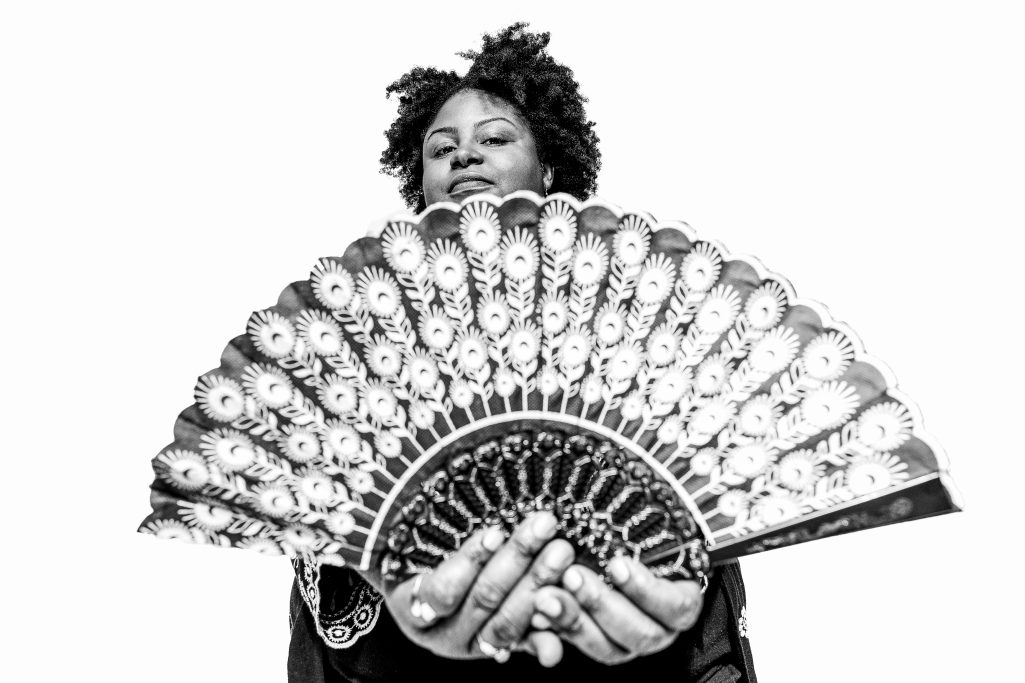A debut album is a singular act of creation, ushering in a brand new version of the universe. A blank slate. A new map, with contours distinct from all the cartography that came before.
With her debut full-length, Moonchild, Richmond jazz vocalist Kenneka Cook has projected a heartening vision of the world — one in which people, genres, and techniques come together in a spirit of connectedness. I had the good fortune to explore her vision when I sat down with her at Pop’s Market on East Grace Street recently.
Moonchild was released on February 23 by American Paradox Records, the fledgling imprint run by Scott Lane of standout rock outfit The Congress. Cook and Lane first met after one of her performances. “There’s a series called REC Room at the Camel,” Cook said. “Scott was in the audience.” Lane was so impressed he wanted to sign her. “Next thing I know, I’m making a record.”
So what brought a jazz singer to REC Room — a showcase for beatmakers organized by the Richmond Electronic Collective? The answer is a surprise, given the full-band arrangements employed on Moonchild, but Cook got her start with looping, a more individualistic technique.
Using just her versatile voice and the Vox Lil’ Looper, a pedal that allows her to create sampled vocal arrangements on the fly, Cook honed her skills performing solo at venues like Emilio’s, Cary Street Café, and Gallery5.
“It started off at Emilio’s,” Cook remembered, “at their open mic. I started going there, and I met a few people in the house band at Emilio’s. From there, it just kind of snowballed into me really getting into the Richmond music scene.”


Though she was performing alone, Cook ensured the experience was far from solipsistic. “It’s hard when you’re standing up there by yourself. It can be intimidating with all those people staring at you. So I [asked], ‘How can I connect with them?’ And so in between songs, [I’d] talk to them. ‘Hey, what’s up? I see you right there. That shirt’s cute.’”
Among the connections she made during that time, that initial conversation with Scott Lane proved to be especially fateful. Following a “stem to stern” model of production, American Paradox artists work with Lane at every step of the album cycle, including recording in his Jackson Ward home. The location inspired Cook.
“That house is over 100 years old,” she said. “I love stuff like that. I think it’s really cool to be able to record in a place that has so much history. It’s on the same block as the Maggie L. Walker Museum, so it’s cool to add more history on history that’s already been made on that block.”
Cook also appreciated Lane’s easygoing style as a producer. ”He’s a real laid back guy, and that makes it easy for everybody.” Easy and tightly-knit, as much of the recording was done in close collaboration — including the vocals. “I would be right beside Scott, recording, and he would be doing whatever on the computer. No crazy sound booth or anything.”
Remarkably, this easy-going, collaborative environment was also established when it came time to record the band. “Everybody was kind of together in one room,” Cook remembered. “[Lane] has this baby grand in the front, and a drum set, so everything was put together.” According to Cook, it’s essentially the same setup as is depicted in the live performance of Moonchild track “Brings Me Back (111)” recorded by videography collective RVATRACK, for which Lane runs audio and acts as project manager.
Whether it’s the physical space, Lane’s approach, or a shared commitment to making good organic music, the community that’s grown around American Paradox Records is as tightly knit as the recording process. A key figure in that ecosystem is Sid Kingsley, the singer, and pianist whose soulful Americana album, Good Way Home, provided an outstanding proof of concept for the label’s in-house methodology last year. It’s Kingsley’s saxophone work you hear in the version of “Brings Me Back (111)” on Moonchild.
“We go to each other’s shows,” Cook said of her labelmates. “We support each other. I feel like it’s a [microcosm] of Richmond, because the Richmond music community is really supportive of each other.”
Moonchild draws expertly from that broader pool of Richmond musicians, with a list of contributors that includes local renaissance man Kelli Strawbridge (who also plays with Cook in the band Mikrowaves), No BS! Brass Band mainstay Marcus Tenney, and multitalented Butcher Brown keyboardist Devonne Harris. “They [made] it easy because they’re so talented,” Cook said. “I was very open to any suggestions they had because what I do is so minimalist. I wanted to have their input [on] anything they heard or thought would sound cool if we tried it. To have those people want to suggest stuff anyway is a blessing in itself.”
Harris played on two songs: “My Universe” and “The Practice.” “He did keys on both tracks, [on] the baby grand in the living room,” Cook said. “He plays everything like he’s a pro at it. He makes it look so easy… It’s funny, because he does this thing: We’ll teach him the song, he’ll do an amazing job, and we’ll [say] ‘That was great!’ He’ll say ‘Oh no, that wasn’t it…’ and we’re [saying] ‘No, that was it!’”
As greatly as Moonchild benefits from the various players it features, the album still feels like a vision that’s distinctively Cook’s — starting with the title.
“I like the moon,” Cook explained. “I’ve always liked space, and I always had weird theories about space and all that stuff as a kid, which any kid probably has. But as I got older, not only the scientific knowledge about space, but also the metaphysical and spiritual sense of the moon the Sun and all that — it made sense. The moon’s connection with the feminine and feminine energy — it’s a reminder to embrace my feminine side.”
During the recording process, she looked for ways to infuse music with her love for the cosmos, which reaches all the way back to childhood evenings spent stargazing with siblings and cousins. “I wanted ‘Moonchild’ to be somewhat mysterious,” Cook said. “I wanted it to be very spacey, and space is a mystery within itself. No matter how much we learn about space, it’s going to always be a mystery, because we’ll never learn everything. I wanted that feel in that track, definitely.”
Cook also sought to provide a sense of balance that married her sample-driven solo performance style with the love of jazz that kicked into high gear when she first heard Billie Holiday sing — a love she’s nurtured by frequenting record stores like Deep Groove, Plan 9, and Steady Sounds, surrounding herself with other legendary voices like Ella Fitzgerald’s and Betty Carter’s.
“I knew for a fact I wanted [the album] to be full band songs and looper-esque songs,” Cook affirmed, “but I [also] knew I wanted to show my diverse taste in music. Jazz is my baby; that’s my heart. [But] I wanted to show I have other interests in music… I wanted to make sure I got a little of everything out there, without it being utterly ridiculous.”
Cook covered Vampire Weekend’s “The Kids Don’t Stand A Chance” as an outlet for her more electronic instincts. “I wanted the Vampire Weekend one to be closer to how it is when I loop it,” she mentioned. “We were thinking, ‘How can we make this sound fun [and] different?’ It has that Mark Mothersbaugh sound to it. Just a piece of my childhood just thrown in there a little bit.”
Conversely, “The Practice” was always destined to be more built-out. “I knew I wanted a traditional sounding jazz song on the record.” The track got an early signal boost in mid-January thanks to Bandcamp’s music discovery show Bandcamp Weekly, which aired the song alongside two others from Moonchild and an interview with Cook. Her photo even spent time on the site’s front page. I asked about how she’s enjoyed the process of promoting the album and engaging with music media.
“I don’t like to talk,” she confessed. “I’m a very quiet, to-myself person, so to be able to express myself through words is kind of nerve-wracking. But it is exciting, because people want to know how this happened.”
Her reticence gets a symbolic nod in the cover art, which features photography by Joey Wharton and lettering by illustrator Leslie Herman. “Because I don’t like talking, I [thought], ‘Let me show who I am the best way possible.’ Looping, even though it is a powerful tool, I feel like it’s minimalist, so I [thought], ‘How do I express that visually?’ So if you notice, my album cover is just this much of me [from the top of the nose up], and then simple lettering that has the moon phases in the O’s. It’s simple, but you can get a lot out of it.”
Cook may not be a big talker, but she’s confident in her work, especially as the number of glowing reviews has grown. “The more positive feedback I’m getting, it’s a little less nerve-wracking.” She has one group of supporters, in particular, that’s provided constant encouragement: Her five sisters.
“I come from a big family,” Cook said. “We’re close. We still are close. We always had each other’s backs. We’re all different, but we’re always supportive of each other… I feel like they promote [Moonchild] more than I do sometimes. I’m being dead serious. I’ll [get] calls from their friends [saying], ‘The album’s amazing. Your sister’s been sharing it around the office.’ So they’re really excited about it.”
Cook grew up in Chesterfield, singing in her church and school choirs, and soaking in the wave of soul music that redefined the genre-leading into the 21st Century. “We had a stereo in our living room,” Cook said, “and every weekend, there was cleaning day.” So she would put on The Miseducation of Lauryn Hill or Erykah Badu’s Baduizm and clean up. It was the kind of sustained, passive listening that plants deep roots, and the impact continues to grow. “Even if I [wasn’t] paying attention to it, it [was] being put into my head. Not forcibly or anything; it was good music. It’s part of our memories. And I go back and listen to it now, and I actually know what they’re talking about. Erykah Badu performed at the [2017] Richmond Jazz Festival, and she said something about waiting for you all to grow up. And I [thought], yes, that makes so much sense!”
Family turned out to be a recurring theme during our conversation, whether she was describing her sisters’ enthusiasm, the virtues of the American Paradox community, or experiences singing in ensemble groups like Mikrowaves and Piranha Rama.
“Playing in other bands — it’s fun,” Cook said. “It’s like a little family. Especially Mikrowaves. I love hanging out with Mikrowaves. I’m guaranteed to laugh with Mikrowaves. To have fun with it — I learned that from Piranha Rama and Mikrowaves. Just make a little family. Because if you guys aren’t connecting in some way, it’s not going to come out the way you want it to.”
It’s an approach she’s hoping to take on the road. When asked what she hoped the release Moonchild would lead to–what her metric for success might be–her answer was clear and decisive. “Touring. That’s the number one thing. I’ve never really gotten to tour before, so to be able to go outside of Richmond and show myself would be cool.”
As for adjusting to her role fronting a bigger group, Cook described engagement as key, regardless of whether she’s looping solo or leading a band. “I love them both for different reasons,” she said. “I feel like when I’m up there by myself, I’m more interactive with the crowd, which is always fun. But when I’m up there with [the band], it’s less of a burden — not mentally freaking out, [thinking] ‘OK, what’s next?’ I can relax a little and interact with the people in the band with me.”
Originally printed in RVA #32 Spring 2018, you can check out the issue HERE or pick it up around Richmond now.
The beauty of Kenneka Cook is how she’s rooted her musical brilliance in human connection, through her literal and metaphorical families and her relationship with the audience. That beauty is affirmed via Moonchild, and Cook is poised to project that truth widely as songs from the album fill living rooms and venues in Richmond and beyond.


Music Sponsored By Graduate Richmond



